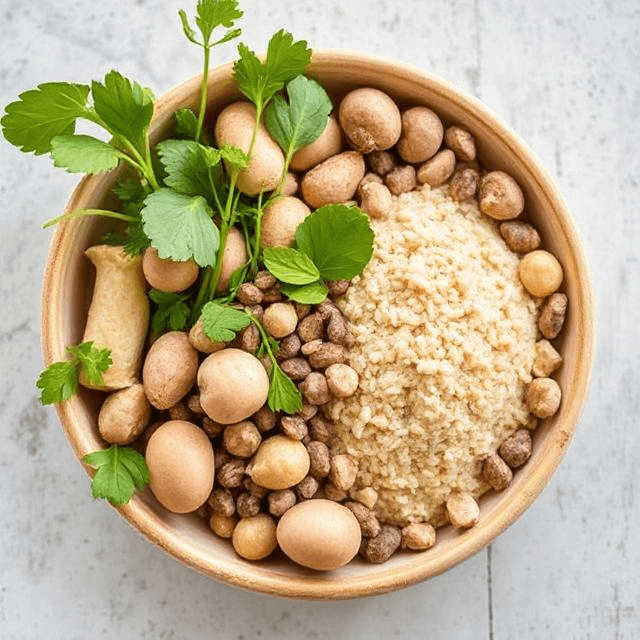In 2025, the health and wellness industry is witnessing a surge in the popularity of Biotin and Prebiotics, two essential components that are transforming how we approach beauty and overall well-being. While biotin has long been recognized as the “beauty vitamin” for its role in improving hair, skin, and nails, prebiotics are emerging as a cornerstone for gut health, which is increasingly linked to external beauty.
This article delves into the benefits of biotin and prebiotics, their synergy in promoting holistic health, and how they can be incorporated into your daily routine for optimal results.

What is Biotin?
Biotin, also known as Vitamin B7 or Vitamin H, is a water-soluble vitamin that plays a crucial role in energy metabolism. It acts as a coenzyme in the breakdown of carbohydrates, fats, and proteins, making it essential for cellular function. Beyond its metabolic benefits, biotin is widely celebrated for its ability to enhance keratin production—a structural protein that strengthens hair, skin, and nails.
Key Benefits of Biotin
- Stronger Hair
Biotin boosts keratin infrastructure in hair follicles, leading to stronger strands and reduced hair thinning. It is often recommended for individuals experiencing hair loss or brittle hair due to biotin deficiency. - Healthier Skin
Biotin supports fatty acid synthesis, which helps maintain skin hydration and elasticity. It also strengthens the skin barrier, reducing dryness and irritation. - Improved Nail Health
Regular intake of biotin has been shown to increase nail thickness and prevent brittleness, making it a go-to supplement for those with weak or splitting nails.
What are Prebiotics?
Prebiotics are non-digestible fibers that serve as food for beneficial bacteria in the gut microbiome. Unlike probiotics (live bacteria), prebiotics nourish the existing good bacteria in your digestive system, helping them thrive. A healthy gut microbiome not only supports digestion but also plays a pivotal role in immune function, mental health, and even skin clarity.
Key Benefits of Prebiotics
- Enhanced Gut Health
Prebiotics promote microbial diversity in the gut, improving digestion and nutrient absorption. A balanced gut microbiome is essential for absorbing vitamins like biotin that contribute to healthy hair and skin. - Clearer Skin
By reducing systemic inflammation through gut health optimization, prebiotics can help alleviate common skin conditions such as acne, eczema, and rosacea. - Hair Growth Support
Prebiotics indirectly support hair health by improving nutrient absorption (e.g., zinc and selenium), which are vital for strong hair follicles.
How Biotin and Prebiotics Work Together
The connection between biotin and prebiotics lies in their combined impact on the gut-skin-hair axis:
- Prebiotics improve gut health by fostering beneficial bacteria that enhance nutrient absorption.
- A healthier gut ensures better absorption of biotin from food or supplements.
- Biotin then works to strengthen keratin production for healthier hair, glowing skin, and stronger nails.
When used together, biotin and prebiotics create a synergistic effect that addresses both internal wellness and external beauty concerns.
Table: Comparing Benefits of Biotin vs. Prebiotics
| Aspect | Biotin | Prebiotics |
|---|---|---|
| Primary Function | Supports keratin production | Feeds beneficial gut bacteria |
| Hair Benefits | Strengthens hair follicles; reduces loss | Improves nutrient absorption for growth |
| Skin Benefits | Enhances hydration; strengthens membranes | Reduces inflammation; balances microbiome |
| Gut Benefits | Indirectly supports gut via nutrient use | Directly improves digestion & immunity |
| Key Sources | Eggs, nuts, sweet potatoes | Garlic, onions, bananas |
How to Incorporate Biotin and Prebiotics into Your Routine
Dietary Sources
- Biotin: Foods rich in biotin include eggs (especially yolks), almonds, walnuts, sweet potatoes, spinach, and salmon.
- Prebiotics: Common sources include garlic, onions, asparagus, bananas, oats, chicory root, and apples.
Supplements
If dietary intake falls short:
- Biotin supplements (5–10 mg daily) are widely available to boost keratin production.
- Prebiotic supplements containing fibers like inulin or fructo-oligosaccharides can enhance gut health by feeding good bacteria.
Lifestyle Tips
- Pair biotin-rich foods with prebiotic-rich meals to maximize nutrient absorption.
- Avoid overuse of antibiotics as they disrupt the balance of gut bacteria.
- Stay hydrated to support both skin hydration and digestive health.
- Maintain a diverse diet to ensure you're getting all essential vitamins and nutrients.
The Science Behind Biotin and Prebiotics
Emerging research highlights the importance of both biotin and prebiotics in achieving optimal health:
- Studies show that biotin deficiency can lead to thinning hair, brittle nails, and dry skin. Supplementing with biotin has been found effective in addressing these issues.
- Research on prebiotics reveals their role in reducing systemic inflammation by balancing the gut microbiome—a critical factor in improving skin conditions like acne or eczema.
- The connection between gut health and beauty is becoming increasingly clear. A healthy microbiome not only supports digestion but also influences hormone regulation and immune responses that affect external appearance.
Why 2025 is the Year of Biotin and Prebiotics
The rise of biotin and prebiotics reflects a growing awareness of holistic health solutions that address both internal wellness and external beauty concerns. Consumers are increasingly seeking natural ways to improve their appearance without relying solely on cosmetics or invasive treatments. This shift has propelled these two nutrients into the spotlight as essential components of modern self-care routines.
In 2025:
- Biotin continues to dominate the beauty market as an effective solution for strengthening hair and nails.
- Prebiotics are gaining traction as more people recognize the link between gut health and overall well-being.
- The combination of these two nutrients offers a comprehensive approach to achieving radiant skin, strong hair follicles, improved digestion—and ultimately better quality of life.
Conclusion
Biotin and prebiotics have become indispensable tools for enhancing beauty from within while supporting overall health. By understanding their unique benefits—and how they complement each other—individuals can take proactive steps toward achieving healthier hair, glowing skin, stronger nails, and better digestive health.
Whether through diet or supplementation, incorporating these powerful nutrients into your daily routine can unlock transformative results. In 2025’s wellness landscape focused on holistic solutions, biotin and prebiotics stand out as game-changers for anyone looking to improve their internal vitality while radiating external beauty.
Research References
- Zou et al., Cell Death Discov. (2023). https://doi.org/10.1038/s41420-023-01443-9
- Treatment Rooms London (2025). https://www.treatmentroomslondon.com/hair-loss/how-can-gut-health-influence-hair-health/
- Plantigo Blog (2024). https://plantigo.in/blogs/plant-based-supplements/the-science-behind-how-to-increase-biotin-and-its-health-benefits
- Wellbeing Nutrition (2024). https://wellbeingnutrition.com/blogs/detox/7-benefits-of-probiotics-on-skin-and-hair
- BMJ Gut Journal (2022). https://gut.bmj.com/content/71/12/2463
- WebMD (2024). https://www.webmd.com/diet/health-benefits-biotin
- News-Medical.net (2024). https://www.news-medical.net/news/20241024/Gut-health-and-diet-Keys-to-treating-acne-alopecia-and-dermatitis.aspx
- DrAxe Nutrition Blog (2024). https://draxe.com/nutrition/biotin-benefits/
- Clinikally Blog (2023). https://www.clinikally.com/blogs/news/the-gut-skin-hair-connection
- Learn Canyon Blog (2025). https://learncanyon.com/power-of-prebiotics-probiotics/
Dr. Ryan Cooper is a physician affiliated with Duke University and Duke University Health System. He specializes in internal medicine and serves as an intern within the Department of Medicine. His education includes medical training at Drexel University College of Medicine, followed by residency at Penn State Hershey Medical Center. Dr. Cooper is board-certified by the American Board of Internal Medicine and is a member of professional organizations such as the American College of Physicians and the Society of Hospital Medicine. His research includes publications on acute kidney injury and renal oxalosis, emphasizing his expertise in internal medicine and nephrology.

